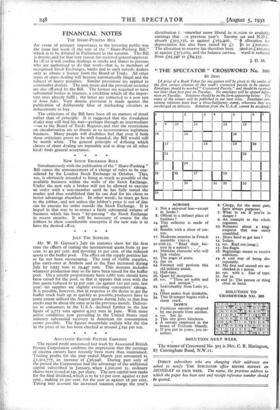FINANCIAL NOTES THE SHARE-PUSHING BILL AN event of primary importance
to the investing public was the issue last week of the text of the " Share-Pushing Bill," which is to be debated in Parliament in the autumn. The Bill is drastic, and for that very reason has received general approval. In cif ect it will confine dealings in stocks and shares to persons who are authorised to do that work-that is, to members of recognised Stock Exchanges, banks and to such outside dealers only as obtain a licence from the Board of Trade. All other types of share-dealing will become automatically illegal and the subject of heavy penalties. Similar provisions are applied to commodity dealers. The unit trusts and the provident societies are also affected by the Bill. The former are required to have substantial bodies as trustees, a condition which all the impor- tant ones already fulfil ; the latter are subjected to a new test of bona fides. Very drastic provision is made against the publication of deliberately false or misleading circulars as inducements to buy.
The criticisms of the Bill have been all on matters of detail rather than of principle. It is suggested that the fraudulent dealer may still find his way-perhaps through an intermediary -on to the Board of Trade Register, and that the restrictions on circularisation are so drastic as to inconvenience legitimate business. Many people will doubtless feel that even if both these criticisms prove to be well founded, the Bill would still be worth while. The general principle of defining which classes of share dealing are reputable and to drop on all other kinds finds general acceptance.
NEW STOCK EXCHANGE RULE Simultaneously with the publication of the " Share-Pushing " Bill comes the announcement of a change of rules to be con sidered by the London Stock Exchange in October. This, too, is obviously intended to bring as much as possible of the available business within the walls of the Stock Exchange. Under the new rule a broker will not be allowed to execute an order with a non-member until he has fully tested the market and thus established that he can deal for his client to better advantage elsewhere. In other words, he must go first to the jobber, and not unless the jobber's price is out of line can he execute his order outside the Stock Exchange. It is hoped in that way to re-attract a fairly substantial volume of business which has been " by-passing " the Stock Exchange in recent months. It will be necessary of course for the jobbers to show considerable enterprise if the new rule is to have the desired (fleet.
* * * *
JULY TIN SUPPLIES
Mr. W. H. Gartsen's July tin statistics show for the first time the effects of cutting the international quota from 55 per cent. to 45 per cent. and devoting to per cent. of the reduced quota to the buffer pool. The effect on the supply position has so far not been encouraging. The total of visible supplies, plus carry-over at Arnhem and in the East increased during July by 1,935 tons to 29,447 tons. This increase includes whatever production may so far have been raised for the buffer pool. On a strictly proportionate basis 1,667 tons should have been raised for the pool, so that it appears that even with the free quota reduced to 35 per cent. (as against Ito per cent. last year) tin supplies are slightly exceeding consumers' takings. It is possible, however, that in response to the desire to get the buffer stock built up as quickly as possible, producers have to some extent utilised the August quotas during July, so that free stocks may be about the same as in the previous month. Deliver- ies to consumers in the U.S.A. declined further to the low figure of 3,775 tons against 4,205 tons in June. With more active conditions now prevailing in the United States steel industry substantial recovery in American tin consumption seems possible. The figures meanwhile explain why the rise in the price of tin has been checked at around £195 per ton.
* * * *
ASSCCIATED BRITISH PICTURE EARNINGS The record profit announced last week by Associated British Picture Corporation confirms the impression that the earnings of cinema owners have recently been more than maintained. Trading profits for the year ended March 31st amounted to £1,302,777, an increase of £36,948. During part only of the period the Corporation had the advantage of the additional capital subscribed in January, when 1,500,000 5s. ordinary shares were issued at 14s. per share. The new capital now ranks for the final dividend, which is to be ro per cent. against II per cent., making 20 per cent. for the year as against 18 per cent. Taking into account the increased taxation charge the year's distribution i; -omewhat more liberal in re .ation to available earnings than ..-se previous year's. - Income tax and N.D.C.
absorb £315,738, as against £163,406. to allocation for depreciation has also been raised by £2 to L2oo,000. The allocation to reserve has therefore been .iited to £200,000 as against £375,000, and the balance carrieu -ward is reduced from £93,346 to £84,335.
J. D. M.


































 Previous page
Previous page